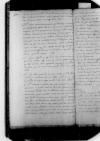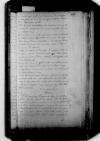Letter #5744
Alfonso de VALDÉS to Ioannes DANTISCUSPalencia, [1527]-09-10
English register:
Valdés regrets his decision to move from Cubillas de Cerrato to Palencia – he doesn’t like the place, he couldn’t find an inn, everyone here is plotting against the old man [Chancellor Gattinara]. He wouldn’t have left so hastily if Dantiscus had been with him in Cubillas. He hasn’t seen the letter to the provost [Balthasar Merklin von Waldkirch]. He is pleased about Dantiscus’s acquaintance with Marliano, he sends his regards. He sends some uncertain news about Genoa; the French have allegedly seized it, he is surprised that the chancellor [Mercurino Gattinara] doesn’t mention this in his letter of September 4 from Barcelona, nor does he inform the emperor. As of the eve of the Feast of the Blessed Virgin Mary's Birth [i.e. as of September 7] the chancellor intends to spend 9 days in [the monastery of] Monserrat and then go to the court. [The archbishop] of York [Thomas Wolsey] has signed a strict alliance with the king of France on behalf of his king [Henry VIII], directed against the emperor. Yesterday envoy Borbonius set out to meet the arriving chancellor. He sends his regards to Dantiscus.
| received Paredes de Nava, [1527]-09-10 Manuscript sources:
Auxiliary sources:
Prints:
| ||||||||||||||||||||
Text & apparatus & commentary Plain text Text & commentary Text & apparatus
Excellentissimo viro, domino
Salutem plurimam.
Valebamus quidem nos quam rectissime in
Litteras ad dominum
Scribit
Rerum hic novarum offendi nihil, nisi
Orator Borbonius discessit heri versus
Haec pauca ad te scribere volui, tu ea boni consules, sum enim et hospitio et sensu etiam privatus. Vale.
Palentiae, 10 Septembris 1527.
Tuus, quicquid est,
[1 ] As regards missions of Nicolas Perrenot de Granvelle to Francis I cf. e.g. Kohler 2000, p. 128

